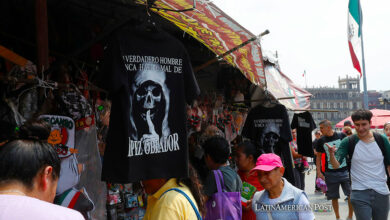Henry Kissinger, the influential diplomat, dies at 100, leaving behind a legacy of Cold War policies that shaped Latin America, drawing both admiration and criticism.

07/29/2019.- (FILE) – Former Secretary of State Henry Kissinger delivers remarks at the US State Department’s 230th Anniversary Celebration in Washington, DC, USA, 29 July 2019 (reissued 30 November 2023). EFE/EPA/JIM LO SCALZO
The Latin American Post Staff and EFE
Escucha este artículo
Leer en español: El legado y la controversia de Henry Kissinger en la historia de América Latina
Henry Kissinger was a significant figure in shaping United States foreign policy towards Latin America during his time as National Security Advisor and later Secretary of State. His influence was particularly evident in the context of the Cold War and the U.S. government's approach to combating the spread of communism in the region.
Supporting Authoritarian Regimes
One of the most notable aspects of Kissinger's involvement in Latin America was supporting authoritarian regimes and military dictatorships in the region as part of the broader U.S. policy of containing the influence of the Soviet Union and communist movements. His statement famously characterized this approach, "I don't see why we need to stand by and watch a country go communist due to the irresponsibility of its people."
Kissinger's support for authoritarian regimes in Latin America, such as those in Chile, Argentina, and Brazil, has been the subject of significant criticism and controversy. He was perceived as being more concerned with advancing U.S. geopolitical interests than with promoting democracy and human rights in the region. His policies were seen as contributing to human rights abuses and political repression in several Latin American countries.
Kissinger's involvement in the 1973 coup in Chile, which led to the overthrow of President Salvador Allende and the installation of General Augusto Pinochet's military regime, remains one of the most contentious episodes in his legacy. Critics argue that his support for the coup and the subsequent actions of the Pinochet regime, including widespread human rights violations, reflected a disregard for democratic principles and human rights in the pursuit of U.S. strategic objectives.
In addition to supporting authoritarian regimes, Kissinger was also involved in diplomatic efforts to manage regional conflicts in Latin America, such as the negotiations to end the 1976-1983 military dictatorship in Argentina and the broader relationships with countries such as Colombia, Mexico, and Venezuela.
Also read: Peru's President Faces Legal Battle Amidst Political Turmoil
Controversial Impact and Ongoing Debate
Despite the controversies surrounding his policies in Latin America, Kissinger's impact on the region was substantial and continues to be a subject of historical debate and analysis. His approach to U.S. foreign policy towards Latin America reflected the broader geopolitical dynamics of the Cold War and the complexities of balancing strategic interests with ethical considerations.
In summary, Henry Kissinger was important to Latin America in the sense that his policies and actions as a key figure in U.S. foreign policy had a significant impact on the region, particularly in terms of supporting authoritarian regimes and managing regional conflicts during the Cold War era. However, his approach and legacy in Latin America remain the subject of intense scrutiny and debate, with critics pointing to the human rights abuses and political repression associated with the regimes he supported.




